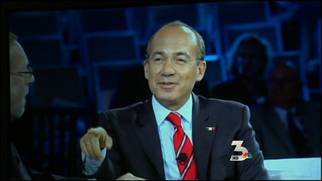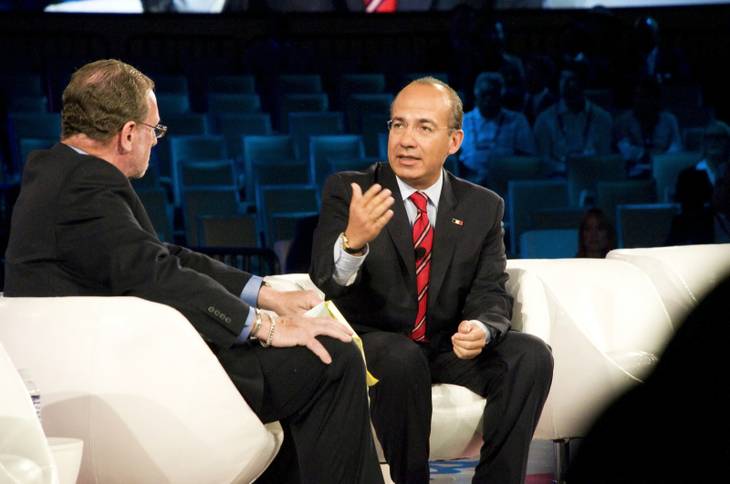KSNV: Calderon at tourism summit

Viewing video requires the latest version of Adobe's Flash Player
KSNV coverage of Mexican President Felipe Calderon at the Global Travel and Tourism Summit, May 19 2011.
VEGAS INC Archives
- In Las Vegas, Janet Napolitano urges streamlined airport security process (5-19-11)
- Convention hall for travel and tourism summit a stunner (5-19-11)
- A Cabinet post on tourism? Obama aide says it would be nice (5-18-11)
- Travel industry leaders meeting in Las Vegas want U.S. to speed up visas (5-17-11)
- Global tourism industry summit lures big names to Las Vegas (5-17-11)
Mexican President Felipe Calderon, who has elevated tourism to a cabinet-level post in his country and made the industry’s success a national priority, proclaimed Mexico to be safe for visitors despite news accounts of bloody drug cartel wars.
“Mexico is a safe place to visit,” Calderon said today at the Global Travel and Tourism Summit, which wrapped up at Aria.
Calderon said he wants Mexico to be one of the top five tourism destinations in the world by 2020. He gathered the country’s 32 state governors to sign an agreement designating 2011 as the “Year of Tourism.”
He appointed Gloria Guevara Manzo, who also was in Las Vegas for the conference, as the nation’s first secretary of tourism.
Mexico, a popular spring break destination, invested in a highway linking El Golfo de Santa Clara to Puerto Penasco, a popular beach destination known as Rocky Point.
Tourism leaders generated discussion about asking President Barack Obama to form a cabinet-level position when one of his senior aides, Valerie Jarrett, spoke at the conference on Wednesday. South Africa was another nation that recently created a top government post for tourism.
Calderon made his remarks in an onstage interview conducted by CBS News Travel Editor Peter Greenberg.
The president said his aggressive reform policies would result in tourism companies from around the world investing in the development of hotels and resorts.
Asked about the drug-cartel violence that has ravaged Mexico and the more than 10,000 gang-related killings reported in 2010, Calderon said “you could count on your fingers” the number of drug-related incidents that involved tourists traveling in Mexico. He said his administration is building a new institutional justice framework to address crime problems.
Mexican law enforcement officials caught or killed 20 of the 37 most wanted criminals in the past two years, he said.
Calderon said his education and health care initiatives also would have an impact and that the country is building 90 new universities and 800 technical schools to educate engineers and technologists to address the nation’s problems.
He said 1,000 hospitals have been built in the past four years, and it is his hope that eventually American citizens would cross the border to seek medical treatments. Greenberg said thousands of people already cross the border every day at Yuma, Ariz., to seek dental treatments in Los Algodones.
Earlier today, conference attendees were addressed by Janet Napolitano, secretary of Homeland Security, and Ted Turner, chairman of Turner Enterprises.
Napolitano asked representatives of the industry for their suggestions to streamline airport security bottlenecks that discourage people from traveling.
Napolitano said the challenge of protecting the millions of passengers who board airliners daily is that new technology to detect explosives, poisons and other toxic materials not only have to be efficient, but scalable to move people quickly.
“We’re moving away from the one-size-fits-all security model,” Napolitano said at the event that brought about 1,000 people to hear top government and business leaders discuss tourism issues.
Napolitano said some of the long-term solutions to streamlining security is to further develop trusted traveler programs like “Global Entry,” a screening process for frequent fliers that would expedite security checks on the day of travel. She said the United States has established a standard for information needed to register a trusted traveler and has reached agreements with Canada, Mexico and the Netherlands to include international travelers from those countries.
Nearly 1 million travelers from those countries and the United States are registered for Global Entry, and she hopes to double that by next year.
She said the Transportation Security Administration is testing a recognition-based system to positively identify airline pilots, a system that could be expanded if successful.
The secretary of what is now the federal government’s third-largest agency said the biggest issue to passengers is “divestiture” — the process of removing coats, shoes and belt buckles at the security checkpoint.
Napolitano said the agency is working on a solution to the problem of passengers having to remove their shoes at checkpoints. She said she recently worked a TSA checkpoint on the Wednesday before Thanksgiving and got a firsthand look at the magnitude of that issue.
She said Homeland Security has simplified its security alert system, eliminating the color-coded system that has been in place. Critics have said the new terminology is just as confusing as the color-coded system.
Napolitano said the traveling public also can participate in improving security with a program Las Vegans are familiar with: “If you see something, say something.”
Transportation companies, airports and rail transportation systems have adopted and publicized the program, which encourages people to notify authorities if they see unattended luggage, backpacks or packages.
Metro Police embraced “If you see something, say something” for Southern Nevada’s tourism industry in December and has publicized the program on billboards and hotel signage in the area.
Turner, an entrepreneur who formed the 24-hour news network CNN and was a one-time owner of the Atlanta Braves professional baseball team, talked to convention attendees about ecotourism and conservation.
